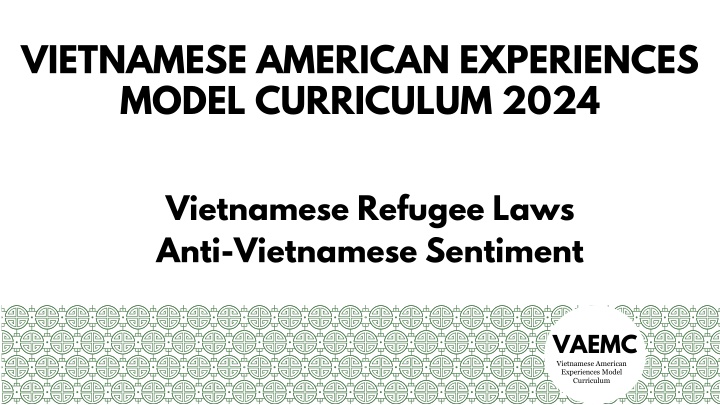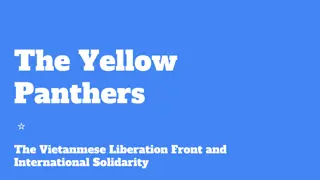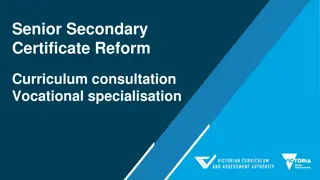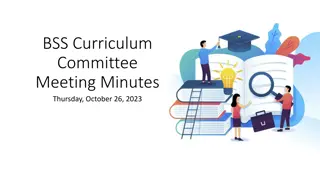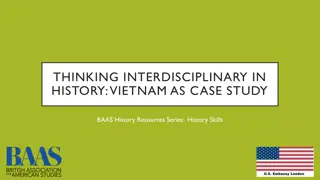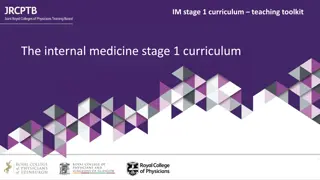Vietnamese American Experiences Model Curriculum 2024
Vietnamese American experiences through the lens of history, refugee laws, and anti-Vietnamese sentiment. Dive into thought-provoking discussions on resettlement, societal impact, and national values.
Uploaded on Feb 25, 2025 | 4 Views
Download Presentation

Please find below an Image/Link to download the presentation.
The content on the website is provided AS IS for your information and personal use only. It may not be sold, licensed, or shared on other websites without obtaining consent from the author.If you encounter any issues during the download, it is possible that the publisher has removed the file from their server.
You are allowed to download the files provided on this website for personal or commercial use, subject to the condition that they are used lawfully. All files are the property of their respective owners.
The content on the website is provided AS IS for your information and personal use only. It may not be sold, licensed, or shared on other websites without obtaining consent from the author.
E N D
Presentation Transcript
VIETNAMESE AMERICAN EXPERIENCES MODEL CURRICULUM 2024 Vietnamese Refugee Laws Anti-Vietnamese Sentiment VAEMC Vietnamese American Experiences Model Curriculum
Think-Pair-Share People are losing their cars, houses, jobs, said a 35-year-old black auto worker in Detroit, who did not want to be identified. Let them stay there until we do something for people here. Far's I'm concerned, they can ship them all right hack. snapped one woman here today and from one end of town to the other and in the cities around the base, many of her neighbors agreed. There's no telling what kind of diseases they'll be bringing with them, said Vincent Davis. What sort of diseases? I don't know, he said, but there's bound to be some of those tropical germs floating around. Last winter, a young Air Force sergeant entered the office of a local fuel company, paid his bill, returned to his car and drove away with his Vietnamese born wife. What gets into boys over there, the manager muttered as he watched the couple drive away, marrying one of those those gooks? But they're not Communists, one student argued. They're coming here because they're running from Communists. It doesn't matter, came the response. They're Vietnamese, aren't they? Robert E. Carr, a 40-year-old realtor in Valparaiso, said that he had the same fears as the children. How do you know we're not getting the had guys? he asked. You can't say for sure. Nobody can, and Lord knows we got enough Communist infiltration now.
Think-Pair-Share I wouldn't resettle rabbits here, no, nothing else. declared Gene S. Umskis, 27, another Detroiter, who is studying data processing. This area is overcrowded now; I don't see why we should sacrifice our jobs and bring in more people. We are not obligated to police the whole world. My parents emigrated, someone had to sponsor them. said a 49-year-old Detroit woman of Polish extraction who works as a cashier to support her seven children because her husband is retired on a disability. It was not a load on the government or on taxpayers. It's a hard world everywhere. Still, charity begins at home, Keep the Vietnamese in Vietnam. Send funds to help them in their own country. They are a burden on this society, said Harry Deligter, who has been receiving unemployment compensation since losing his job as a night club pianist last year. We have enough problems without carrying more unemployed persons. They are out of their environment, said Rusty Foy, a carpenter. They can't speak English, and they will be on welfare before they get off the airplane. And who pays for that? We do. Who is going to support them? asked Lynn Vogelman, a secretary. Am I going to have a choice whether my taxes are going to support those unfortunate people? If I don't have a choice, I don't want them coming. These people [Vietnamese] that have got the dough and have been selling heroin for the last 10 years, I say no.
Think-Pair-Share We are a nation of refugees. Most of us can trace our presence here to the turmoil or oppression of another time and another place. Our nation has been immeasurably enriched by this continuing process. We will not turn our backs on our traditions. We must meet the commitments we have made to other nations and to those who are suffering. In doing so, we will also be renewing our commitments to our ideals. Ford stated, [T]o ignore the refugees in their hour of need would be to repudiate the values we cherish as a nation of immigrants, and I was not about to let Congress do that.
Think-Pair-Share What was your initial reaction to American attitudes towards Vietnamese refugees in 1975? Are these attitudes different today? Do you see these similar attitudes used for other minority groups coming to America?
Content Learning Objectives Central Questions: How have immigration, labor, and deportation law shaped the experiences of Vietnamese American refugees? Is the law color-blind? How does the language of the law disadvantage certain ethnic and racial groups in American society?
Anti-Vietnamese Sentiment Ku Klux Klan terrorizes Vietnamese refugees on Gulf coast of Texas
Anti-Vietnamese Sentiment Last winter, a young Air Force sergeant entered the office of a local fuel company, paid his bill, returned to his car and drove away with his Vietnamese born wife.\ What gets into boys over there, the manager muttered as he watched the couple drive away, marrying one of those those gooks? When President Nixon's ordering of troops into Cambodia stirred nationwide protests in 1970, Fort Walton Beach residents organized a march in support of the invasion. But at Fort Walton Beach High School yesterday, many of the students were talking about organizing a gook klux klan. And the members of a 12th grade psychology class said they were frightened that the refugees would attempt to convert them to Communism.
Anti-Vietnamese Sentiment But they're not Communists, one student argued. They're coming here because they're running from Communists. Vietnamese Aren't They? It doesn't matter, came the response. They're Vietnamese, aren't they? A senior girl said that she had not heard a single good word about the arrival of the Vietnamese except from my sister.
Anti-Vietnamese Sentiment Robert E. Carr, a 40 year old realtor in Valparaiso, said that he had the same fears as the children. How do you know we're not getting the had guys? he asked. You can't say for sure. Nobody can, and Lord knows we got enough Communist infiltration now. Nevertheless, despite the rumors of epidemics and the economic fears and the racial epithets, the Vietnamese are coming. But in a town where the local hank once distributed John Birch Society literature with monthly statements, it does not seem that they could possibly be happy here.
Anti-Vietnamese Sentiment Gov. Jerry Brown of California, 1975-1983, 2011-2019 Our biggest problem came from California, Julia Taft, director of President Ford s Interagency Task Force on Indochina Refugees, told National Public Radio in 2007. They were very difficult, she said, referring to Mr. Brown and Obledo. They didn t want any of these refugees because they had also unemployment. They had already a large number of foreign-born people there. They said they had too many Hispanics, too many people on welfare. They didn t want these people. Mr. Brown finally relented, Taft said, when she told him she would go on TV and to the media and to the voluntary agencies and announce that the governor did not want any church, synagogue, family [or] former military family in California to be able to help these people.
Anti-Vietnamese Sentiment Similar feelings have been reported in communities around Camp Pendleton in Orange County, CA and Fort Chaffee, AR where other refugees are being sent. In Phoenix, a Classics Professor Goes on a Home-Buying Odyssey. Which One Did She Choose? Here in California, official resentment over the influx has perhaps been the strongest of all. Ever since the plan to evacuate South Vietnamese was announced, Gov. Edmund G. Brown Jr. has protested loudly that he did not want them taking jobs from Americans in his state, which has nearly million unemployed. Yesterday, the Brown administration proposed that Congress amend the Vietnamese refugee aid bill that it is considering to provide jobs for Americans first.
Indochina Migration and Refugee Assistance Act To enable the United States to render assistance to, or on behalf of, certain migrants and refugees. Be it enacted by the Senate and House of Representatives of the United States of America in Congress assembled, that this Act may be cited as "The Indochina Migration and Refugee Assistance Act of 1975." -Duc Nguyen, director
Indochina Migration and Refugee Assistance Act SEC. 2. (a) Subject to the provisions of subsection (b), there are hereby authorized to be appropriated, in addition to amounts otherwise available for such purposes, $155,000,000 for the performance of functions set forth in the Migration and Refugee Assistance Act of 1962 (76 Stat. 121), as amended, with respect to aliens who have fled from Cambodia or Vietnam, such sums to remain available in accordance with the provisions of subsection (b) of this section. (b) None of the funds authorized to be appropriated by this Act shall be available for the performance of functions after June 30, 1976, other than for carrying out the provisions of clauses (3), (4), (5), and (6) of section 2(b) of the Migration and Refugee Assistance Act of 1962, as amended. None of such funds shall be available for obligation for any purpose after September 30, 1977.
Indochina Migration and Refugee Assistance Act SEC. 3. In carrying out functions utilizing the funds made available under this Act, the term "refugee," as defined in section 2(b)(3) of the Migration and Refugee Assistance Act of 1962, as amended, shall be deemed to include aliens who: (A) Fled from Cambodia or Vietnam because of persecution or fear of persecution on account of race, religion, or political opinion, (B) Cannot return there because of fear of persecution on account of race, religion, or political opinion, and (C) Are in urgent need of assistance for the essentials of life
Indochina Migration and Refugee Assistance Act Allocated money for temporary holding facilities in the United States (Camp Pendleton, Fort Chaffee, etc.) Made specific provisions for resettlement in other countries (not U.S.) Gave Vietnamese refugees non-resident alien status over lawful permanent resident status from their refugee status About 150,000 Vietnamese refugees evacuated before passage of bill (May 23, 1975) 1977: Congress announces refugee admissions would be reduced to only 15,000 How do these specific provisions differ from the source put forth by immigration.com? Why does the narrative differ so greatly?
Refugee Act of 1980 Act created first legal definition of refugee based on UN Convention as separate from immigrant Refugees from 1975-1980 were treated as illegal migrants on parole due to Indochinese Refugee Act in 1975 Initial goal of repatriating all 125,000 refugees after spending time in camps 56% of Americans did not support admission of any Indochinese refugees (anti-Vietnamese sentiment) Refugee Act of 1980 only admitted those who could prove that they had a well-founded fear of persecution In reality, only those who could justify fleeing Vietnamese communism were admitted Those displaced by U.S. bombing in Vietnam, Laos, and Cambodia, including ethnic minorities who fought in a U.S.-backed Secret War in Laos, were not admitted
Orderly Departure Program (ODP) Massive boat departures from Vietnam in 1978 and 1979 gave urgency to the need to establish a safer means of exodus for those wishing to leave. In 1979, a Memorandum of Understanding was negotiated between the Socialist Republic of Vietnam (SRV) and the United Nations High Commission for Refugees (UNHCR), establishing the Orderly Departure Program (ODP), an international effort involving more than 40 receiving countries.
Orderly Departure Program (ODP) The objective of the ODP is to establish an alternative to clandestine and often hazardous boat departures by providing a legal emigration program for those seeking family reunification, or those of special interest to the various resettlement countries. The ODP also seeks to minimize the strain large numbers of refugee arrivals have placed on the region's countries of first asylum. This paper outlines the procedures currently followed by the U.S. Orderly Departure Program.
Humanitarian Operation (HO) Who gets to be a refugee? What conditions may exclude you from being resettled in the U.S.? Joint U.S. - Vietnamese Announcement of Humanitarian Resettlement Program Following is the text of the joint US-Vietnam Humanitarian Resettlement Program announcement: The Government of the United States and the Government of the Socialist Republic of Vietnam) jointly announce that, taking into consideration the request from the United States Government, the Government of Vietnam expresses its willingness to cooperate with the United States to resolve humanitarian resettlement issues.
Humanitarian Operation (HO) This is a limited process to receive new applications from Vietnamese citizens who might have been eligible under three categories of the former Orderly Departure Program for consideration for resettlement to the United States. This process is limited only to those who were unable to apply or who were unable to complete the application process before the Orderly Departure Program closed on September 30, 1994. The three Orderly Departure Program categories are the HO, U-11 and V-11 subprograms. Persons whose previous Orderly Departure Program applications were denied in the past are not eligible to re-apply for Humanitarian Resettlement. Persons who were previously notified of their ineligibility for former Orderly Departure Program categories are ineligible to re-apply.
Humanitarian Operation (HO) For free, accurate information about this process, please contact the Refugee Resettlement Section at the Consulate General in Ho Chi Minh City. Contact information is listed below. Access Criteria for Humanitarian Resettlement HO category Former Re-Education Center Detainees: a) Vietnamese applicants who spent three or more years in a re-education center as a result of their close association with U.S. agencies or organizations to implement United States Government programs and/or policies prior to April 30, 1975; OR b) Vietnamese applicants who spent at least one year in a re-education center as a result of their close association with the U.S. Government prior to April 30, 1975, and who were also trained for any length of time in the United States or its territories under the auspices of the United States Government prior to April 30, 1975; OR
Humanitarian Operation (HO) c) Vietnamese applicants who spent at least one year in a re-education center as a result of their close association with the United States Government prior to April 30, 1975, and had been directly employed by the United States Government, a U.S. company or a U.S. organization for at least one year prior to April 30, 1975; OR d) Widow/widower applicants whose spouse was sent to a re-education center as a result of his/her close association with the United States Government prior to April 30, 1975, and who died while in a re-education center or died within one year after release.
Graphic Organizer and Source Analysis Causes: What were some main reasons this law was created? What pressures did the government have to balance? (ex: anti-Vietnamese sentiment) What main historical events influenced this law? Effects: What aspects/assumptions of previous refugee law did this law base itself on? What new aspects/assumptions were introduced? What are some ways this law helped Vietnamese refugees? What are some ways this law inadvertently hurt Vietnamese refugees? Narratives: What "narrative" or "story" is this law putting forth? How does it present the narrative? What are some main motivations that help the U.S. save face, maintain empire, or respond to domestic/international opinion regarding the plight of Vietnamese refugees?
Poster Activity Causes: What were some main reasons this law was created? What pressures did the government have to balance? (ex: anti-Vietnamese sentiment) What main historical events influenced this law? Effects: What aspects/assumptions of previous refugee law did this law base itself on? What new aspects/assumptions were introduced? What are some ways this law helped Vietnamese refugees? What are some ways this law inadvertently hurt Vietnamese refugees? Narratives: What "narrative" or "story" is this law putting forth? How does it present the narrative? What are some main motivations that help the U.S. save face, maintain empire, or respond to domestic/international opinion regarding the plight of Vietnamese refugees?
Reflection When does a refugee stop being a refugee? What does it mean to stop being a refugee? Legally? Socially? Politically? What historical factors may influence when someone stops being a refugee?
